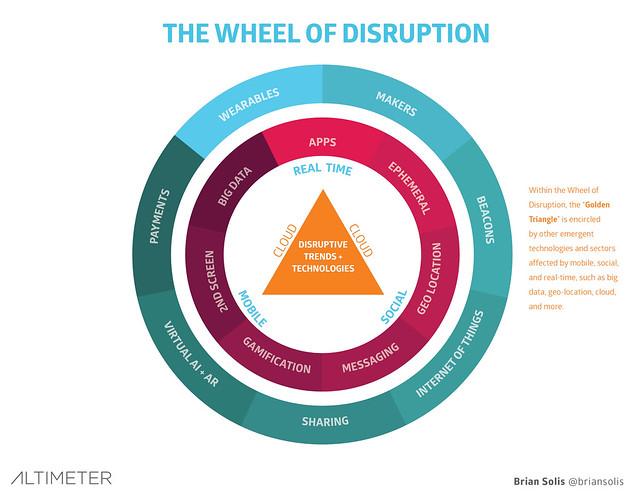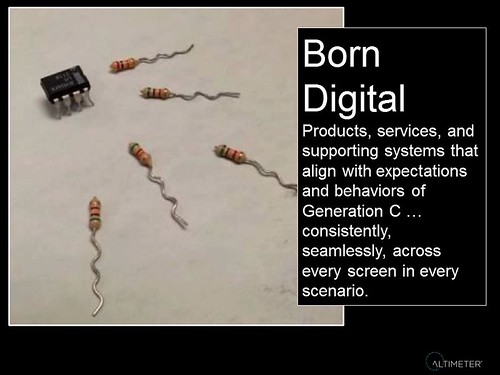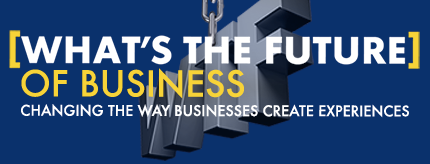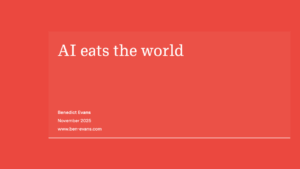Businesses today are met with unique challenges and opportunities that necessitate pause. For years, management models were developed to optimize the pursuit of business objectives. Processes were established and hierarchies, technologies and reporting systems supported them. Everything was business as usual until it wasn’t.
Nothing is permanent. As in life, things change. And so is true in the world of business. The models and practices that have been taught for generations are tested in a time when customer and employee behaviors and resulting expectations are evolving without official study, strategy and systematic transformation.
Digital Darwinism: Survival of the Fitting
Technology permeated society to the point where the vast separation between professional and personal access was obliterated. And, the line between online and offline was forever obscured creating an always-on society with an insatiable appetite for consumption and connectedness.
Over the years, technology has impacted how everyday people communicate, share, discover, and learn. Some of you will read the previous sentence and think, “and yes, it’s completely ruined our society and we are worse for it.” Others will read it and continue without contemplation as the sentence states the obvious, “and?”
This divide reveals a stunningly under appreciated challenge facing any organization that hopes to survive in an era connectedness. With foresight, its clear that the situation before us is dire. It is how decision makers react now that either defines their destiny or seals their fate. In a world where Digital Darwinism rewards those who adapt as technology and society evolve, I believe many models governing how organizations are not only outdated, they reflect management’s vision in how it competes for the future.
With the barrage of digital devices, services, networks, apps, many organizations are merely reacting to trends with terminal skepticism or half-baked attempts to embrace new technologies and opportunities. In each case, what’s new is often interpreted or dealt with through the very perspective, methods and practices that contribute to business as usual.

“Wheel of Disruption” from What’s the Future of Business: Changing the way businesses create experiences
Social media, mobile, real-time, each has contributed to the digital lifestyle that everyday people, your consumers AND your employees, embrace as second nature. It’s not just a Millennial or a Generation Z thing…it’s everyone who uses a smartphone, a tablet, or any smart device. It’s someone who takes selfies and takes pictures and videos at every live event. It’s also that person who checks Twitter and Facebook each morning before email for mentions of their name and see what they might have missed. It is for all intents and purposes, you and me.
This isn’t about age; this is about a connected generation (Generation-C) and it represents a significant share of consumerism. Simply said, this category of consumers is different from the traditional customers and employees around which many organizations are modeled.
To reach them requires a different approach. To see them and the value they represent to an organization takes vision and a different philosophy. Instead however, most executives or decision-makers employ an “us vs. them” mentality. They see the world as they know it rather than seeing the world for what it is or what it’s becoming.
#AdaptorDie – Lead by example, don’t lead by following examples
Let me put this plainly…
Connected customers are growing.
Traditional customers are fading.
To compete for the future takes an investment in new philosophies and models where relevance and resilience become part of the corporate DNA.
Traditional management practices and the structures that support them are not only aging, they’re liabilities and competitive disadvantages. It’s not just today’s competitors who will realize that connected consumers are a different breed. Unforeseen competitors, some that may not even exist today, will see what it is that you do not to change market direction, and as a result, take market share.
This is a time that requires great introspection and empathy. This is a time for leadership.
The goal now is to open our perspective to explore a world that we do not know in order to lead our organization in a direction of greater relevance. We must discover what is truly is valuable to Generation-C, why, and how to use these insights to inspire more desirable products, services, and even stories and messages. The next step is of course to bring them to life through new processes, systems, and directives.
This is why I believe that the future of business takes leadership not management. Executives, employees, and other stakeholders or shareholders who do not share in the desire to earn relevance with a different customer is standing in the way of progress.
Born Digital – We are the Champions
Well-meaning decision makers don’t know what they don’t know. As such, they will need a little help and this is an opportunity for champions who believe in the need for organizational transformation.
The case for change won’t be won by new technology alone. It’s not social, mobile, or real-time that presents the answer in of itself. It is the affect they have on consumer behavior that matters. Attempting to convince anyone of the need for change should never include mentions of Facebook, Twitter, Pinterest, iPhones, iPads, et al. These are means but not a means to an end. What’s required is an understanding of market trends and impact, missed opportunities versus actual short and long term losses, the balance of connected vs. traditional consumerism, and a better understanding of how innovation in the product roadmap will prevent disruption while disrupting others through innovation.
Technology is merely an enabler…and a powerful one at that. But without vision, purpose, direction, or meaning, new channels are the conduits for old reasoning and convictions. Without understanding technology and its relationship with behavior, without aligning a bigger mission or vision with what we are trying to do — something that is going to matter to people — we are just managing businesses the way we always have. We are not moving in any new direction.
This is a time to lead the next era where ideas are “born digital.” Rather than discount how, when, and where people connect…innovate! Born digital is a mantra and a philosophy that invests in products, services, and supporting systems that align with the expectations and behaviors of Generation C…consistently, across every screen, in in the context of every scenario.
Born digital doesn’t take what already exists and attempt to repackage it as something new. Born digital isn’t conceived by groups of strategists or executives who question the logic of a selfie. Seriously. Born digital is the result of empathy and inspiration to do something extraordinary in the truest meaning of the word…something that is designed for a new generation…purpose built to deliver unique and exceptional experiences.
Born digital is deliberate and it is inspired. But to conceive it takes vision to see what others do not and courage to do what others will not or cannot.
“Management is doing things right; leadership is doing the right things.” – Peter Drucker
Connect with me…
Twitter | LinkedIn | Facebook | Google+ |Youtube | Instagram | Pinterest







Amused at how this is all about doing things differently, then you finish with a quotation from a man born in 1909, who last worked in business before WW2 and how was held up as the guru for the old ways of business.
Leadership is an ego-trip – part of the autocratic age of business – and one of the things we need to get away from in creating our new direction.
logic and perspective is timeless. i don’t see it among the executives i work with often. however, i do see egos quite a bit.
Have to agree, the quote is timeless and is as true now as it was then. We may need to start thinking of new and different ways to do things, but that does not mean we must let go of any traditional methods all together!
I think this articles is a spot on depiction of many businesses right now. Getting connected is something that rising and future generations were born with- no longer is there offline, you’re correct. I can’t say that this is a good or bad thing, only that it is the reality of how we will move forward in both our personal and business lives. If businesses don’t embrace this trend, they serve to suffer from obsoleteness somewhere down the road.
Very true!
This is the first article I have read that has connected today’s generations together with a common digital theme. You accurately depict society’s willingness to separate the people of the world by something as simple as generation- as if we don’t all utilize forms of social media to interact with one another. I appreciate the way you break down the barriers society has built up and show that we are all connected in generation c.
Thank you Amanda.
I was drawn back to this article after reading it a month or so ago. Really good stuff Brian. Technology is indeed merely an enabler . . . it is too easy to forget this fact when so much emphasis is placed on a shiny, tangible embodiment of what is often a much bigger idea.
Thanks for coming back. 🙂
“Connected customers are growing.
Traditional customers are fading.”
Completely true in today’s society. Without engagement to technology and accepting it, the gap between the two generation becomes larger and larger. It’s quite humbling to know that you have the availability of accessing an exponential amount of data at the very ends of your fingertips.
How would one approach this in a company that has a huge gap between generations? At on
side of the company are people who have been working there for decades, while newer individuals (who are lucky to find a job today) want to help make them more efficient by becoming more technologically based?
Excellent thoughts. I get this question quite a bit and to be honest, I need to put something a bit more thoughtful together. The answer isn’t easy.